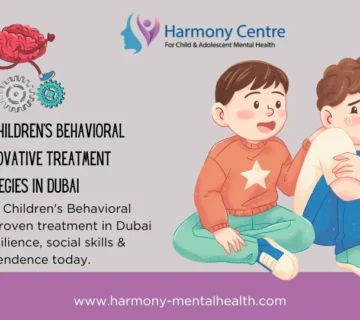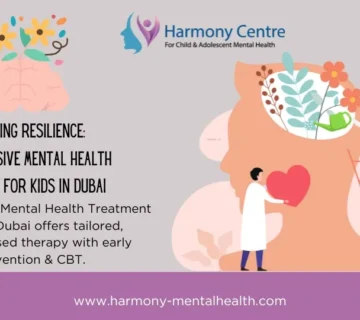Managing Digital Addiction in Children in Dubai: Strategies for a Balanced Life
Discover evidence‑based strategies to manage digital addiction in children in Dubai. Learn practical tips for healthy screen use—book a free consultation now in the UAE!
Children today spend more time than ever on digital devices. In Dubai, busy lifestyles and academic pressures push screen time higher. Excessive screen use can lead to digital addiction. It impacts mental health, disrupts sleep, and hinders social skills. At Harmony Centre, we offer active, evidence‑based solutions to manage digital addiction. We help families create balanced routines that promote healthy digital habits and overall well‑being.
Book a Free Consultation in Dubai Now and take the first step toward a balanced digital lifestyle for your child.
Contact Information
| Contact Method | Details |
|---|---|
| Phone | +971 (52) 8773268 / 04 558 2015 |
| Click Here | |
| info@harmony-mentalhealth.com | |
| Address | Office 409, Building Alrazi-64C, 26th St, Healthcare City, Dubai |
1. Introduction: The Need for Digital Balance
Modern technology surrounds us. Digital devices offer learning and connection. However, too much screen time can harm a child’s mental health. In Dubai, children face academic stress and social pressures. Digital overload worsens anxiety and reduces sleep quality. Our team at Harmony Centre understands that managing digital addiction is key to improving mental health. We empower families with practical strategies that bridge therapy and daily life.
Furthermore, healthy digital habits boost concentration and social interactions. Our approach works with parents, teachers, and children to create a supportive, balanced routine. By acting early, you can reduce the risks of digital addiction and foster long‑term resilience.
2. Understanding Digital Addiction in Children
Digital addiction refers to an unhealthy attachment to screens. Children may spend excessive hours on smartphones, tablets, or computers. This overuse can lead to several issues:
- Emotional Effects:
Excessive screen time often causes irritability, anxiety, and mood swings. Children may feel overwhelmed by constant digital stimulation. - Social Impact:
Too much screen time reduces face‑to‑face interactions. It can isolate children from peers and impair social skill development. - Academic Challenges:
When digital use interferes with studies, concentration drops. Homework and learning suffer, resulting in lower grades. - Physical Health Concerns:
Prolonged screen use can cause eye strain, headaches, and disrupted sleep. Poor sleep affects energy levels and overall health. - Behavioral Problems:
Children may show increased impulsivity and difficulty in regulating emotions. They may rely on screens to escape stress rather than facing it.
Understanding these challenges helps you take steps to manage digital addiction. When you address these issues early, you improve your child’s mental and physical well‑being. Our assessments at Harmony Centre use practical tools and direct observation to determine the impact of digital use on your child.
3. Our Approach to Managing Digital Addiction
At Harmony Centre, we use a proactive, integrated approach. We begin with a comprehensive evaluation. Next, we design a personalized plan that fits your child’s needs. Our multidisciplinary team uses active strategies to foster healthy digital habits. We work closely with families to make sure our plans align with daily life.
Key Steps in Our Process
- Initial Evaluation:
We start by gathering information. We use brief questionnaires, direct observations, and interviews with parents. This step helps us understand your child’s digital habits and related behaviors. - Personalized Digital Plan:
We tailor a plan that sets clear screen time limits and encourages alternative activities. Our plan includes daily routines, mindfulness exercises, and outdoor activities. - Interactive Therapy Sessions:
We conduct sessions that teach practical skills. We use Cognitive Behavioral Therapy (CBT) techniques to help children reframe negative digital habits. We include mindfulness exercises that calm the mind. - Parental Guidance Workshops:
We train parents in effective digital parenting. These workshops offer strategies to monitor and manage screen time. We help you set boundaries and create tech‑free zones at home. - School Collaboration:
We work with educators to align digital guidelines. Consistent support across home and school reinforces positive habits. We offer recommendations for homework breaks and digital detox times. - Ongoing Monitoring and Support:
We schedule regular follow‑up sessions. Our team reviews progress and adjusts the plan as needed. We use telehealth options to ensure continuous support.
This active, personalized approach bridges clinical care with everyday routines. It empowers families to manage digital use effectively and build lasting resilience.
4. Impactful Client Outcomes
Our digital wellness programs produce measurable, positive results. Many families share success stories that inspire us. Here are some impactful outcomes:
- Improved Emotional Regulation:
Children show a 30–50% improvement in managing emotions when digital use is balanced. They become calmer and more resilient. - Better Sleep Quality:
Reduced screen time results in more restful sleep. Parents note that children wake up refreshed and energetic. - Enhanced Academic Focus:
With fewer digital distractions, students improve their concentration. Teachers report better engagement and higher grades. - Stronger Social Connections:
Children develop better interpersonal skills when they spend more time interacting face‑to‑face. This leads to improved peer relationships. - Empowered Families:
Parents feel more confident in managing digital habits. They learn practical strategies that reduce household conflicts related to screen time.
These outcomes, supported by qualitative feedback and quantitative data, confirm that our integrated approach to digital wellness makes a lasting difference.
5. Practical Strategies for Daily Integration
To reinforce digital wellness at home, families can adopt simple, active strategies. These tips help create a balanced digital environment and promote overall well‑being.
1- For Parents
- Set Clear Screen Time Limits:
Define specific daily limits for all family members. Use parental control apps to enforce these rules. This helps prevent excessive use. - Establish Tech‑Free Zones:
Create areas in your home where digital devices are not allowed, such as bedrooms and the dining room. This encourages face‑to‑face interaction and better sleep. - Model Healthy Digital Behavior:
Reduce your own screen time. Engage in offline activities with your child. Children learn by observing you. - Plan Family Activities:
Schedule regular outings or indoor games that do not involve screens. This fosters social connections and reduces digital dependency. - Educate on Digital Literacy:
Teach your child about online safety and the importance of balancing digital and real‑life activities. Use age‑appropriate resources and discussions.
2- For Children and Adolescents
- Create a Daily Routine:
Develop a structured schedule that includes study time, outdoor play, and digital breaks. Visual schedules help maintain consistency. - Practice Mindfulness:
Incorporate short mindfulness exercises, such as deep breathing or guided meditation, into your daily routine. This helps calm the mind and reduce stress. - Engage in Offline Hobbies:
Encourage activities like reading, drawing, or sports. These hobbies provide a healthy alternative to screen time. - Set Personal Goals:
Help your child set realistic goals for reducing screen time. Celebrate each small achievement to build motivation and self‑esteem. - Participate in Group Activities:
Join clubs, sports teams, or community events. Social engagement enhances interpersonal skills and reduces isolation.
3- For the Whole Family
- Hold Regular Family Meetings:
Create a space for open discussion about digital habits and challenges. Use these meetings to adjust rules and share successes. - Use a Digital Journal:
Track screen time and its effects on mood and sleep. This record helps monitor progress and identify patterns. - Attend Workshops Together:
Participate in digital wellness workshops offered by Harmony Centre. Learn strategies and share experiences with other families. - Foster Open Communication:
Encourage every family member to share their thoughts and feelings about digital use. This builds trust and promotes mutual understanding.
By implementing these practical strategies consistently, you build a robust support system that bridges clinical care with everyday life. This integration reinforces healthy digital habits and promotes overall mental wellness for the entire family.
FAQs & Final Thoughts on Managing Digital Addiction in Children
Book a Free Consultation Now
Final Thoughts about Managing Digital Addiction in Children
Managing digital addiction is crucial in today’s technology-driven world. At Harmony Centre, we integrate clinical care with practical, everyday strategies to create a balanced digital environment. Our evidence‑based approach empowers families to manage screen time, improve emotional regulation, and enhance overall mental wellness. By adopting these strategies, you can create lasting, positive change in your child’s life.
Take the first step toward digital wellness. Book a Free Consultation in Dubai Now and let our expert team guide you on your journey to a balanced, healthy digital lifestyle.
For more resources and further information, please visit the Dubai Health Authority website.
Embrace digital balance today—because every child and family deserves a healthy, thriving future in the digital age.
👉 Book a Consultation Now: Call +971 4 558 2015 or visit www.harmony-mentalhealth.com.
Join our online community and stay updated with our latest events, articles about Managing Digital Addiction in Children



